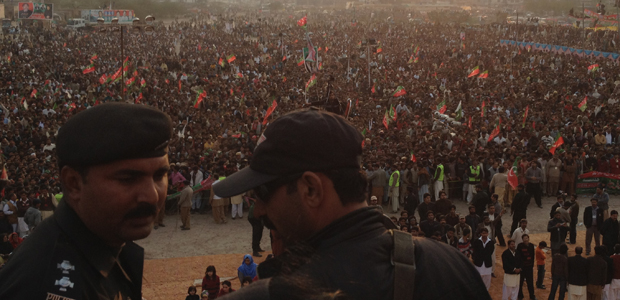Imran Khan: up close and personal
Channel 4 News gets up close and personal with Imran Khan – a man dismissed by his opponents as a cricket-loving lightweight, but who now attracts hundreds of thousands to his political rallies.
It has taken the best part of fifteen years for Mr Khan to begin to silence his critics. A former international playboy who frequented the London nightclub circuit, his political ambitions were initially laughed off as celebrity mania.
Yet swathes of supporters have now ensured that he has successfully made a dramatic transformation to become – as chairman of the Tehrik-e-Insaf (Movement for Justice) party – a serious contender in the cut-throat world of Pakistani politics.
In October, more than 100,000 supporters flocked to one of his rallies – the first of several appearances to attract such numbers.
The following month, his status as a formidable opponent as was sealed as former foreign minister, Shah Mahmood Qureshi, joined his ranks. Key Muslim League-Nawaz stalwart, Javed Hashmi, followed suit in December.
Yet his ramped-up rhetoric has caused a stir, both within the boundaries of his nation, including among the military intelligence services, and beyond.
It’s not being anti-American, it’s being anti war on terror. From day one, I’ve opposed it. It’s the most senseless war ever fought. Imran Khan
He is critical of US drone strikes in the north western tribal belt which are blamed for the death of hundreds of Pakistani civilians. At a rally attended by Channel 4 News, he told supporters he would reject US aid, saying: “We will break ourselves from the shackles of American slavery.”
But speaking to Channel 4 News he denied making anti-US statements. “Name anything [I’ve said] which is anti-US. I’ve never been anti any society. It’s not being anti-American, it’s being anti war on terror. From day one, I’ve opposed it. It’s the most senseless war ever fought.”
He has also caused some alarm in Washington for saying that, if elected, he will withdraw the Pakistani Army from tribal borders, from which militant groups have launched attacks both against Pakistan and Afghanistan.
Would this entail handing Pakistani territory over to the Taliban? “Absolutely not,” he replied.
“You will fix it with a political settlement. Dialogue. I will will the people over to our side, [with] truth and reconciliation, because their villages have been bombed. Women and children have been killed.
“Once there is a ceasefire, jihad is over, [there is] truth and reconciliation, and then I will leave it to the people in tribal areas who will deal with the militants.”
Read more: John Sparks blogs about Imran Khan and his campaign trail

People power?
On domestic matters, he has been a harsh critic of the ruling administration under President Asif Ali Zardari, whom he has described as a “crook”. He pledges to rid the system of corruption within 90 days if he becomes prime minister.
And it’s his cricket background which will ensure this will happen, he claims. He said: “For me, 21 years on the cricket field, and 10 years as captain gave me invaluable experience in competing and struggling. If you do not accept defeat, no one can defeat you.”
Elections are due to be held in February 2013 although a snap vote could be held at any time.
For many in Pakistan, it is arguably his political inexperience which makes him attractive. Pakistani politics has gained unwanted notoriety for its endemic corruption. Since independence in 1947, it has been ruled by a succession of political family dynasties and military generals who have seized power in a series of coups.
Now, he says, it is ready for clean leadership. “You can easily have all of them [current politicians] disqualified,” Mr Khan said. “The battle is who’s going to take on the status quo. Everyone says ‘I’m for the poor’. But it’s when you get there, you find out who will really mend it and who just used slogans to come to power.”
Naïve rhetoric it may be, but it certainly strikes a chord among his supporters. This may be the reason that the country’s intelligence agencies are now reportedly interested in Mr Khan, with some reports suggesting he is being backed by military intelligence agency, the Inter Services Intelligence.
Veteran journalist and analyst, Najam Sethi, told Channel 4 News: “The intelligence agencies of this country began to monitor the situation. They were going to people and saying, ‘join Imran Khan, support Imran Khan’. They were telling the media to support Imran Khan.”
Perhaps that may be why some say that Mr Khan has had an easy ride from the normally vocal Pakistani media.
For him, however, it’s little more than “people power”.
Read more: Pakistanis rally against drone assassination campaign
Imran Khan's opposition:
Name: President Asif Ali Zardari
Born: Karachi, Sindh, 26 July, 1955
Family: Widower of former Prime Minister, Benazir Bhutto
Party: Pakistan People's Party
Number of seats: 93 in the National Parliament - highest number.
Name: Nawaz Sharif
Born: 25 December, 1949. Lahore, Pakistan
Family: Brother Shabaz Sharif is chief minister of Punjab province; nephew Hamza Shahbaz Sharif is a National Assembly member. Daughter Maryam Nawaz a party member.
Party: Pakistan Muslim League-N
Number of seats: 68